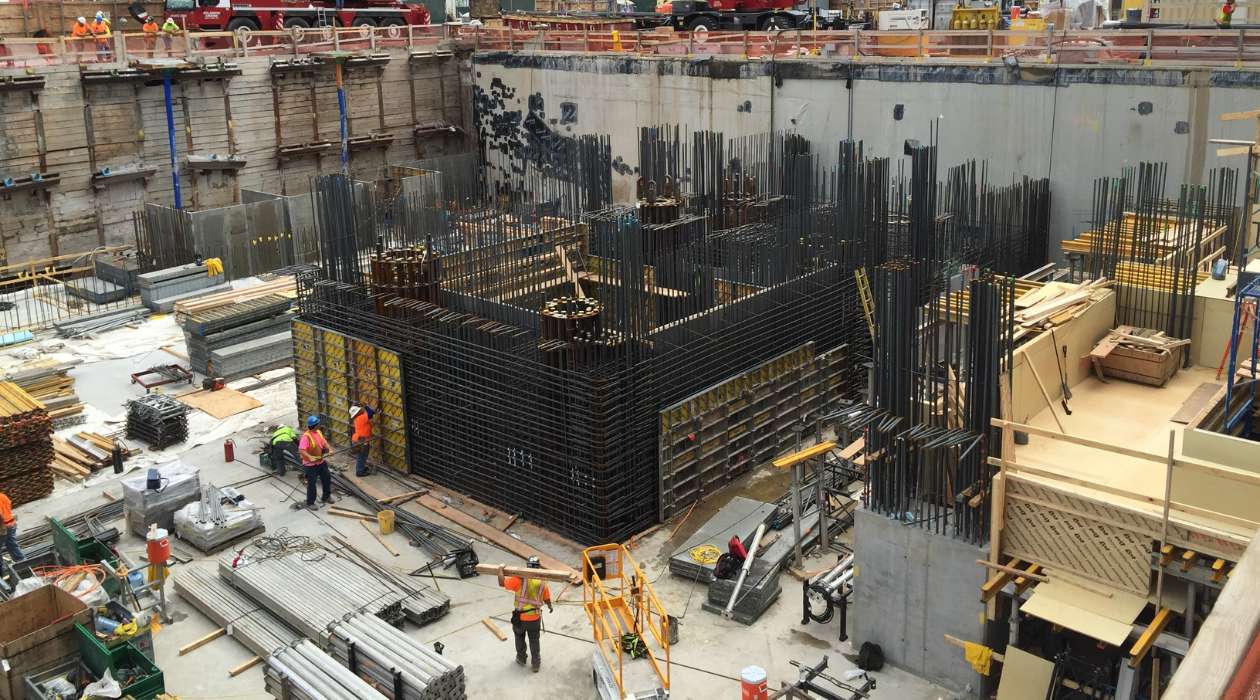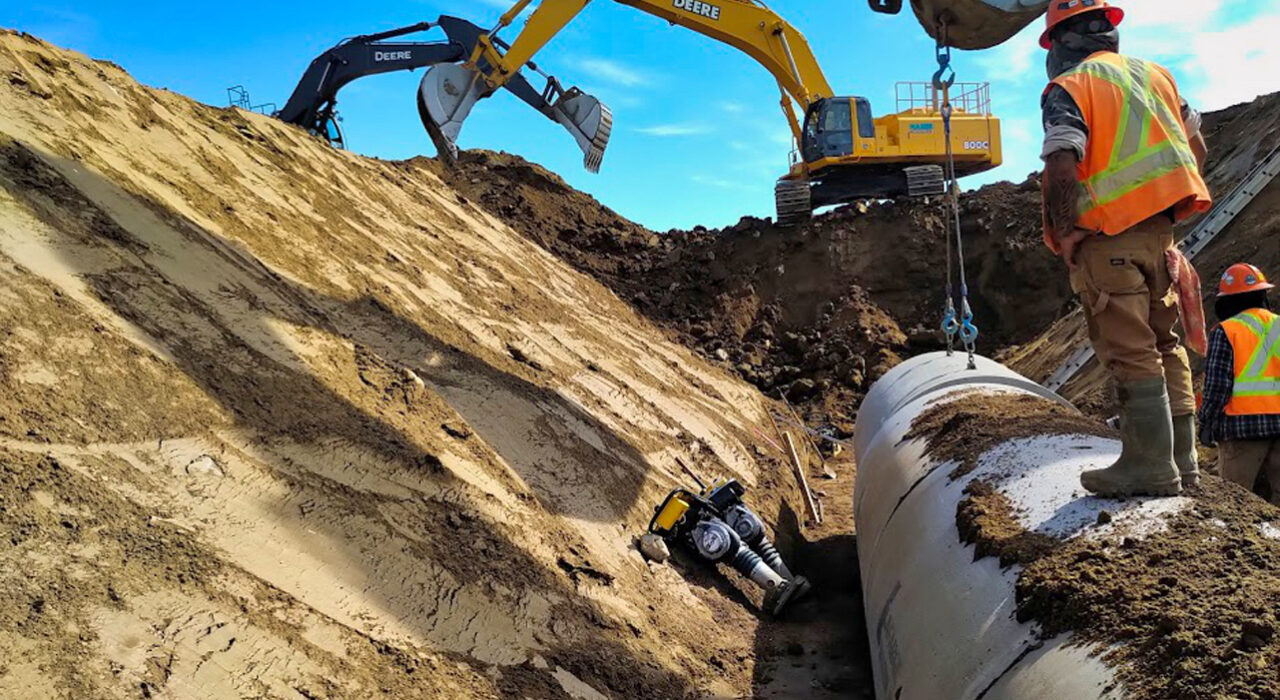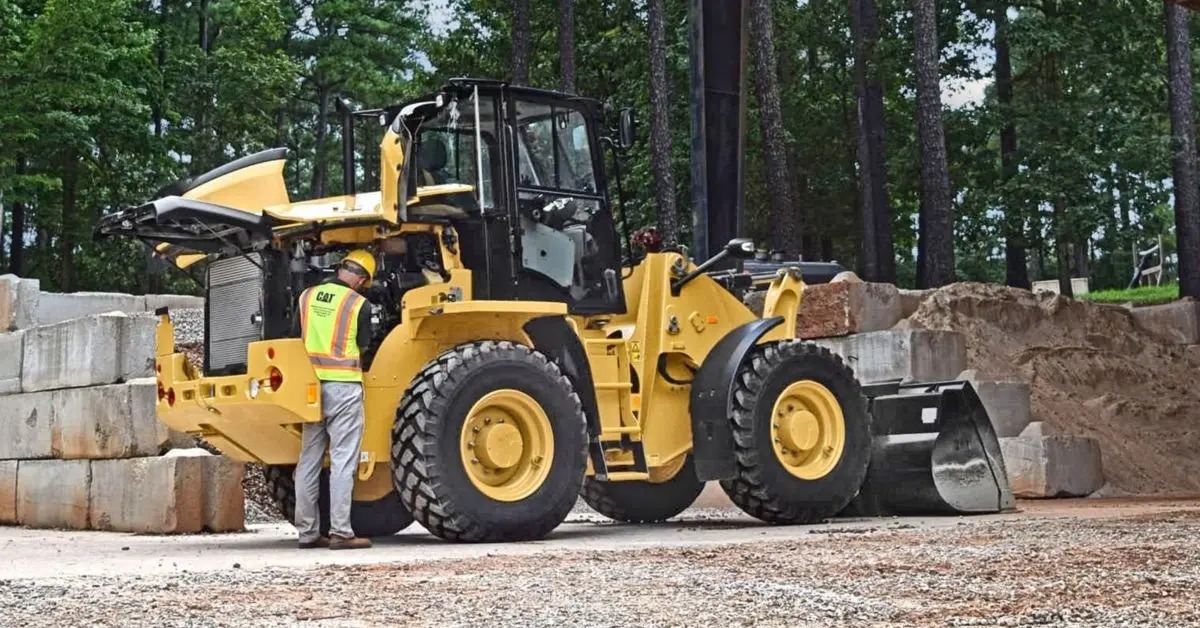Home>diy>Building & Construction>How To Own Your Own Construction Company


Building & Construction
How To Own Your Own Construction Company
Modified: January 24, 2024
Learn the essential steps to start and manage your own construction company. From building permits to project management, discover how to succeed in the competitive field of building construction.
(Many of the links in this article redirect to a specific reviewed product. Your purchase of these products through affiliate links helps to generate commission for Storables.com, at no extra cost. Learn more)
Introduction
Welcome to the world of construction! If you have a passion for building and creating, starting your own construction company can be a fulfilling and lucrative endeavor. In this article, we will guide you through the essential steps of launching your very own construction company.
Building a construction company requires a unique blend of technical skills, business acumen, and a deep understanding of the industry. From finding your niche to securing financing, from registering your company to managing projects and ensuring safety, we will cover everything you need to know to succeed in this competitive field.
But before we dive into the nitty-gritty details, it’s important to note that starting a construction company is not a decision to be taken lightly. It requires dedication, hard work, and the willingness to adapt to ever-changing demands and challenges.
So, if you’re ready to roll up your sleeves and embark on this exciting journey, let’s explore the key steps to owning your own construction company.
Key Takeaways:
- Finding Your Niche
Identify your construction niche by aligning your skills and interests with market demands. Specializing in a specific area will help you attract the right clients and build a strong reputation. - Financial Management
Effective financial planning, budgeting, and monitoring are crucial for the success of your construction company. Proper management of finances and cash flow ensures stability and supports business growth.
Finding Your Niche in the Construction Industry
When starting a construction company, it’s crucial to carve out a niche for your business. The construction industry is vast and diverse, encompassing residential, commercial, industrial, and infrastructure projects. By finding your niche, you can specialize in a specific area and stand out from the competition.
Start by assessing your skills, expertise, and interests. Do you have experience in residential construction, or are you more inclined towards commercial projects? Are you drawn to sustainable and eco-friendly construction methods, or are you passionate about historical restoration? Identifying your strengths and interests will allow you to align your business with projects that align with your vision.
Research the market to identify opportunities and assess the competition. Are there any gaps or untapped markets in your region? Are there specific types of construction projects that are in high demand? Understanding the market dynamics will help you position your company strategically.
Consider your target audience and their specific needs. Are you targeting homeowners, real estate developers, or government entities? Understanding the needs and preferences of your target clients will allow you to tailor your services and marketing efforts accordingly.
Additionally, keep an eye on emerging trends in the construction industry. Are there any new technologies, materials, or methodologies that are gaining popularity? By staying up to date with industry trends, you can position your company as an innovative and forward-thinking player in the market.
Remember, finding your niche doesn’t mean limiting your services. It simply means focusing your expertise and marketing efforts on specific areas where you can excel. As your business grows, you can always expand into new areas and diversify your client base.
By finding your niche, you can differentiate your construction company and position yourself as a go-to expert in your chosen field. Whether it’s luxury residential construction, sustainable building, or commercial renovations, specializing in a specific niche will help you attract the right clients and build a strong reputation in the industry.
Developing a Solid Business Plan
A well-crafted business plan is the foundation of any successful construction company. It serves as a roadmap that outlines your company’s goals, strategies, and financial projections. Here are the key elements to include in your business plan:
- Executive Summary: This section provides an overview of your company, its mission, and its unique selling proposition. It should effectively communicate the value you bring to the market.
- Company Description: Describe your construction company in detail, including its legal structure, location, and the services you offer. Highlight your company’s strengths and competitive advantages.
- Market Analysis: Research and analyze the construction industry in your target market. Identify your target customer segments, assess the size of the market, and analyze the competitive landscape. Understanding the market dynamics will help you develop effective marketing and sales strategies.
- Organization and Management: Outline the organizational structure of your company, including the roles and responsibilities of key team members. Highlight their relevant experience and qualifications.
- Products and Services: Provide a detailed description of the construction services you offer. Explain how your services meet the needs of your target market and provide a competitive edge.
- Marketing and Sales Strategy: Outline your marketing and sales plans. Define your target market, identify your unique selling points, and outline how you will promote your services and attract customers. Include strategies for online and offline marketing, networking, and building relationships with industry partners.
- Financial Projections: Develop a comprehensive financial plan that includes revenue forecasts, expense budgets, and cash flow projections. This will help you assess the financial feasibility of your business and secure financing.
- Risk Assessment: Identify potential risks and challenges that may impact your construction company. Develop contingency plans to mitigate these risks and ensure business continuity.
- Implementation Plan: Detail the steps you will take to launch and grow your construction company. Set achievable goals and establish timelines for each milestone.
- Exit Strategy: Consider your long-term goals and develop an exit strategy for your construction company, whether it’s through a sale, merger, or passing it on to future generations.
Remember, a business plan is a living document that should be revisited regularly and updated as your company evolves. It will guide your decision-making process, help you secure funding, and keep you focused on your goals as you navigate the construction industry.
Securing Financing for Your Construction Company
Securing adequate financing is crucial for launching and growing your construction company. Construction projects often require substantial capital to cover equipment, materials, labor, and other expenses. Here are some options to consider when seeking financing:
- Traditional Bank Loans: Approach banks and financial institutions to discuss loan options. Banks may offer term loans or lines of credit based on your creditworthiness and business plan. Prepare a solid business plan and financial projections to present to lenders, demonstrating your ability to repay the loan.
- Government Funding Programs: Research government-funded programs that support small businesses in the construction industry. These programs may provide loans, grants, or loan guarantees for eligible companies. Check with local, state, and federal agencies for potential funding opportunities.
- Investors and Partnerships: Consider seeking investors or entering into partnerships with individuals or companies that can provide the necessary capital. In exchange, they may receive equity in your business or expect a return on their investment. Thoroughly assess potential investors and create a solid partnership agreement to protect your interests.
- Equipment Financing: Construction companies often require specialized equipment and machinery. Explore equipment financing options, such as leasing or equipment loans, to acquire the necessary tools without a significant upfront expense.
- SBA Loans: The Small Business Administration (SBA) offers various loan programs designed to support small businesses. These loans often have favorable terms and lower interest rates. Research the SBA’s 7(a) and 504 loan programs to see if you qualify.
- Crowdfunding: Consider utilizing crowdfunding platforms to raise capital for specific projects or to support your construction company’s growth. Develop a compelling campaign that clearly communicates the value of your project or company to attract potential backers.
- Personal Savings and Family/Friends: Utilize personal savings or funds from family and friends to bootstrap your construction company. Be cautious when borrowing from loved ones and ensure clear repayment terms are established to preserve relationships.
Regardless of the financing option you choose, it’s essential to have a clear plan for utilizing the funds. Create a detailed budget that outlines how the funds will be allocated across different aspects of your construction company, such as equipment purchases, hiring personnel, marketing, and project expenses.
When seeking financing, be prepared to present a robust business plan, financial projections, and supporting documentation to demonstrate the viability and profitability of your construction company. Building relationships with lenders, investors, and potential partners is also crucial. Network with industry professionals and attend construction trade shows and events to expand your connections and explore funding opportunities.
Remember, securing financing is not just about the money; it also involves building trust with lenders and investors. Show your commitment, expertise, and passion for the construction industry to instill confidence in those who hold the purse strings.
Registering Your Construction Company
Registering your construction company is a crucial step in establishing its legal identity and ensuring compliance with applicable regulations. Here are the key steps involved in the registration process:
- Choose a Business Structure: Determine the most suitable legal structure for your construction company. Common options include sole proprietorship, partnership, limited liability company (LLC), or corporation. Each structure has its own advantages and disadvantages, so carefully consider factors such as liability protection, taxation, and ownership flexibility.
- Choose a Name: Select a unique and memorable name for your construction company. Ensure that the name is not already in use by another business and check for availability with the appropriate government authorities. Consider trademarking your company name to protect your brand.
- Obtain an Employer Identification Number (EIN): Apply for an EIN from the Internal Revenue Service (IRS). This identification number will be required for tax purposes and when hiring employees.
- Register with the Secretary of State: Visit your state’s Secretary of State website to register your construction company. Provide the necessary information, including the company name, business structure, registered agent, and other details as required.
- Apply for Licenses and Permits: Research and identify the licenses and permits required to operate a construction company in your area. This may include a general contractor’s license, specialty trade licenses, permits for specific construction projects, and compliance with local zoning and building codes. Contact the relevant licensing boards or regulatory authorities for application procedures.
- Register for Taxes: Register with the appropriate tax authorities at the federal, state, and local levels. This typically involves obtaining a tax identification number, understanding your tax obligations, and setting up a system for filing and remitting taxes.
- Acquire Insurance: Consult with an insurance agent to determine the necessary insurance coverage for your construction company. This may include general liability insurance, workers’ compensation insurance, and builder’s risk insurance to protect against potential risks and liabilities.
- Open a Business Bank Account: Separate your personal and business finances by opening a dedicated business bank account. This will help streamline your financial management and ensure accurate recordkeeping.
- Comply with Ongoing Reporting Requirements: Be aware of any ongoing reporting and compliance obligations, such as annual filings, maintenance of business licenses, and tax filings. Stay updated on any changes to regulations or requirements that may impact your construction company.
It’s essential to consult with a legal professional or business advisor to ensure you complete all the necessary steps and comply with local regulations. Each jurisdiction may have specific requirements, so thorough research and attention to detail are key.
Registering your construction company establishes its legal presence, provides credibility to clients and stakeholders, and protects your personal assets. By completing this process diligently, you set a solid foundation for the future success and growth of your construction business.
Read more: How To Make Your Construction Company Grow
Obtaining the Necessary Licenses and Permits
Operating a construction company requires obtaining the necessary licenses and permits to comply with legal and regulatory requirements. These licenses and permits ensure that your construction projects meet safety standards, protect the environment, and adhere to local building codes. Here are the key licenses and permits you may need to secure:
- General Contractor License: In many jurisdictions, a general contractor license is required to legally operate a construction company. This license demonstrates your competence and knowledge in overseeing construction projects. The specific requirements for obtaining a general contractor license vary by state and may include passing an exam, providing proof of experience, and meeting financial and insurance requirements.
- Trade Licenses: Depending on the nature of your construction work, you may need trade-specific licenses. These licenses are required for specialized trades such as electrical work, plumbing, HVAC installation, or roofing. Each trade has its own licensing requirements, including education, experience, and certification.
- Building Permits: Before starting a construction project, you must obtain the necessary building permits from the local building department. Building permits ensure that your project complies with zoning regulations, building codes, and safety standards. The permit process typically involves submitting detailed plans and specifications for review and paying the required fees.
- Environmental Permits: If your construction projects involve activities that may impact the environment, you may need to obtain environmental permits. This includes permits for activities such as excavation near water bodies, handling hazardous materials, or disposal of waste. Contact the appropriate environmental agencies or departments to determine which permits are required.
- Occupational Safety and Health Administration (OSHA) Compliance: Construction companies must comply with OSHA regulations to ensure a safe working environment. This includes adhering to safety standards, providing training to employees, and maintaining proper documentation. Familiarize yourself with OSHA requirements and ensure compliance through regular inspections and employee training programs.
- Contractor’s Bond: Some jurisdictions require construction companies to obtain a contractor’s bond. This bond provides financial protection to clients and ensures that you fulfill your contractual obligations. The bond amount and requirements vary depending on the location and the scope of your construction projects.
- Insurance Coverage: While not a license or permit, having appropriate insurance coverage is essential for any construction company. General liability insurance, workers’ compensation insurance, and builder’s risk insurance protect your business, employees, and clients in the event of accidents, injuries, or property damage.
It’s crucial to research the licensing and permitting requirements specific to your jurisdiction. Contact the local building department, licensing boards, and other relevant regulatory bodies to understand the specific requirements and processes for obtaining the necessary licenses and permits.
Compliance with licensing and permitting regulations is not only a legal requirement but also a mark of professionalism and trustworthiness. It demonstrates to clients and stakeholders that your construction company operates with integrity and adheres to industry standards. Stay up to date with any changes or updates to licensing and permitting requirements to ensure ongoing compliance throughout the life of your construction company.
Building a Reliable and Skilled Team
A successful construction company relies heavily on the skills and capabilities of its team members. Building a reliable and skilled team is essential for delivering high-quality projects, meeting deadlines, and maintaining strong client relationships. Here are some key steps to building a strong and capable team:
- Define Roles and Responsibilities: Clearly define the roles and responsibilities of each team member to ensure everyone understands their specific contributions. Identify the skills and expertise required for each position and outline the expectations for performance and accountability.
- Recruitment and Hiring: Develop a comprehensive hiring process to attract talented individuals to your construction team. Utilize a combination of online job postings, industry-specific job boards, and networking to reach potential candidates. Conduct thorough interviews, check references, and consider relevant experience and qualifications when making hiring decisions.
- Training and Development: Invest in ongoing training and development programs for your team members. This can include technical training on construction techniques and safety procedures, as well as professional development programs to enhance leadership and communication skills. Providing opportunities for growth and advancement can significantly boost employee morale and loyalty.
- Promote Collaboration and Communication: Foster a collaborative and open communication culture within your team. Encourage regular team meetings, toolbox talks, and project debriefs to share knowledge, address concerns, and ensure everyone is on the same page. Establish effective communication channels to facilitate information sharing and coordination.
- Emphasize Safety: Prioritize safety as a core value of your construction team. Implement comprehensive safety protocols, conduct regular safety training sessions, and enforce strict adherence to safety guidelines. Providing a safe working environment demonstrates your commitment to the well-being of your team members.
- Recognize and Reward Excellence: Acknowledge and reward outstanding performance within your construction team. Whether it’s through bonuses, incentives, or public recognition, celebrating achievements boosts morale and fosters a positive work environment. Encourage teamwork and collaboration by recognizing the collective efforts of your team.
- Promote a Positive Company Culture: Cultivate a positive company culture that values teamwork, professionalism, and continuous improvement. Encourage a healthy work-life balance, provide opportunities for team-building activities, and foster a sense of camaraderie among your team members.
- Manage Performance and Provide Feedback: Regularly assess and manage the performance of your team members. Provide constructive feedback, address any performance issues promptly, and offer opportunities for improvement. Establish development plans to help individuals reach their full potential within the company.
Remember, building a reliable and skilled team is an ongoing process. Continuously invest in your team’s development, offer opportunities for skill enhancement, and create a work environment that promotes collaboration and growth. A strong and capable team will not only contribute to the success of your construction projects but also enhance the overall reputation and growth of your construction company.
Setting Up a Proper Accounting System
Setting up an effective accounting system is crucial for the success and financial stability of your construction company. Proper financial management ensures accurate record-keeping, enables informed decision-making, and helps you stay compliant with tax regulations. Here are the key steps to setting up a proper accounting system:
- Choose an Accounting Method: Determine whether you will use the cash basis or accrual basis accounting method. The cash basis records transactions when cash is received or paid, while the accrual basis records transactions when they occur, regardless of cash flow timing. Consult with an accountant to assess which method is best suited for your construction company.
- Select Accounting Software: Choose reliable accounting software that suits the needs of your construction business. Look for features such as project costing, job tracking, invoicing capabilities, and integration with other business systems. Popular options include QuickBooks, Xero, and FreshBooks.
- Chart of Accounts: Develop a chart of accounts specific to your construction company. This is a structured list of categories that track your income, expenses, assets, liabilities, and equity. Customizing your chart of accounts enables accurate categorization and reporting of financial transactions.
- Set Up Financial Categories: Create financial categories that align with the construction industry. This may include project-related expenses, subcontractor costs, equipment purchases, materials, and labor. Clearly define these categories to track project costs accurately and assess profitability.
- Establish a Budget: Develop a comprehensive budget that outlines your anticipated income and expenses. Allocate resources for different aspects of your construction company, such as marketing, overhead costs, and project-related expenses. Regularly review and compare your actual financial performance against the budget to identify areas for improvement.
- Track Income and Expenses: Consistently record all income and expenses using your chosen accounting software. Categorize transactions accurately to track sources of revenue and where your money is being spent. Regularly reconcile bank and credit card statements to ensure complete and accurate financial data.
- Invoicing and Accounts Receivable: Develop a streamlined invoicing process to ensure timely receipt of payments. Clearly outline payment terms and follow up on overdue payments. Implement an effective accounts receivable management strategy to minimize cash flow gaps.
- Purchase Orders and Accounts Payable: Implement a system for managing purchase orders and accounts payable. Keep track of your business expenses, ensure timely payments to suppliers, and maintain accurate vendor records. This helps prevent missed payments, late fees, and ensures a positive relationship with suppliers.
- Regular Financial Reporting: Generate regular financial reports to assess the financial health of your construction company. Key reports include profit and loss statements, balance sheets, cash flow statements, and job costing reports. Analyze these reports to make informed decisions, measure project profitability, and identify areas for cost control.
- Consult with Accounting Professionals: Seek guidance from accounting professionals, such as certified public accountants (CPAs) with expertise in construction accounting. They can provide valuable insights, assist with tax planning, and ensure compliance with financial regulations.
Accurate and organized financial records are vital for the long-term success of your construction company. By setting up a proper accounting system, you can effectively manage your finances, make informed business decisions, and ensure the financial stability and growth of your construction business.
Tip: Before starting your own construction company, gain experience in the industry, obtain necessary licenses and certifications, and create a solid business plan.
Marketing and Promoting Your Construction Company
Effective marketing and promotion are crucial for attracting clients and establishing a strong presence in the construction industry. With a well-planned marketing strategy, you can differentiate your construction company from competitors and showcase your expertise. Here are key steps to market and promote your construction company:
- Understand Your Target Market: Identify your target market and understand their needs, preferences, and pain points. Consider the types of construction projects they undertake, their budgets, and their desired outcomes. This knowledge will help you tailor your marketing messages and tactics to resonate with your ideal clients.
- Develop a Strong Brand Identity: Create a compelling brand identity that aligns with your construction company’s values, mission, and target market. Design a professional logo and develop a consistent visual identity across all marketing materials, including your website, business cards, signage, and social media profiles.
- Build a Professional Website: Establish a user-friendly website that showcases your construction company’s services, projects, and expertise. Include informative content, high-quality images, and testimonials from satisfied clients. Ensure the website is mobile-responsive and optimized for search engines to improve your online visibility.
- Utilize Search Engine Optimization (SEO): Optimize your website’s content with relevant keywords, meta tags, and descriptive headers to improve its ranking in search engine results. Focus on local SEO to target clients in your area. Provide valuable content, such as blog articles and project case studies, to demonstrate your industry knowledge and attract organic traffic.
- Networking and Relationship Building: Attend industry events, join professional associations, and actively network with potential clients, suppliers, and industry professionals. Establishing strong relationships can lead to referrals and new business opportunities.
- Showcase Your Projects: Highlight your completed construction projects through a portfolio on your website or in a physical brochure. Showcase the quality of your work and emphasize the value you bring to clients. Include details about the projects, challenges you overcame, and client testimonials to build trust and credibility.
- Social Media Marketing: Leverage social media platforms such as LinkedIn, Instagram, and Facebook to showcase your construction projects, share industry insights, and engage with your target audience. Use visual content, behind-the-scenes footage, and educational posts to generate interest and build a strong online presence.
- Online Reviews and Testimonials: Encourage satisfied clients to provide online reviews and testimonials. Positive reviews and ratings on platforms like Google My Business, Yelp, and Houzz can significantly boost your credibility and attract new clients.
- Referral Programs: Implement a referral program to incentivize existing clients, suppliers, and industry partners to refer new business to your construction company. Offer discounts, rewards, or other incentives to those who refer clients that convert into projects.
- Advertise Strategically: Consider targeted advertising methods such as online pay-per-click (PPC) campaigns, local publications, or industry-specific publications to reach your desired audience. Allocate your advertising budget judiciously to ensure maximum return on investment.
Remember, marketing is an ongoing effort, and it’s important to regularly assess the effectiveness of your strategies and make adjustments as needed. Continuously monitor your online presence, keep up with industry trends, and adapt your marketing tactics to stay ahead of the competition. With a strong marketing and promotion plan, you can increase brand awareness, attract valuable clients, and position your construction company for long-term success.
Read more: How To Manage A Construction Company
Managing Projects and Meeting Deadlines
Efficient project management is essential for the success of your construction company. It involves organizing resources, coordinating tasks, and ensuring that projects are completed on time and within budget. Here are key steps to effectively manage projects and meet deadlines:
- Define Project Scope: Clearly define the scope, objectives, and deliverables of each project. Set realistic expectations with the client and establish clear communication channels to facilitate project updates and changes.
- Create a Detailed Project Plan: Develop a comprehensive project plan that outlines the tasks, timelines, and milestones involved. Break down the project into manageable stages and assign responsibilities to the appropriate team members. Use project management software or tools to track progress and facilitate collaboration.
- Allocate Resources: Determine the resources required for each project, including labor, equipment, materials, and subcontractors. Ensure that resources are available and scheduled effectively to avoid delays and bottlenecks.
- Establish a Project Schedule: Develop a realistic timeline for each project, considering factors such as weather conditions, site accessibility, and procurement lead times. Clearly communicate the schedule to all stakeholders and regularly monitor progress to identify potential issues and take corrective action.
- Effective Communication: Foster open and transparent communication with the client, your team, and subcontractors. Regularly provide project updates, address concerns promptly, and ensure that all stakeholders are well-informed of any changes or delays.
- Monitor and Control Costs: Implement cost control measures to ensure that projects stay within budget. Continuously track expenses, compare actual costs against budgeted estimates, and identify any deviations. Take proactive steps to address cost overruns and seek cost-saving opportunities without compromising quality.
- Risk Management: Identify potential risks and develop a comprehensive risk management plan. Anticipate and mitigate potential issues such as weather disruptions, material shortages, or subcontractor delays. Regularly assess project risks and have contingency plans in place to minimize their impact on project timelines.
- Effective Team Management: Assign tasks to team members based on their skills and abilities. Clearly communicate expectations, provide necessary resources, and empower team members to take ownership of their responsibilities. Foster a collaborative and supportive work environment that encourages teamwork and personal development.
- Monitor Quality Control: Implement a rigorous quality control process to ensure that construction work meets or exceeds industry standards and client expectations. Regularly inspect workmanship, conduct necessary tests, and address any quality issues promptly to prevent rework or delays.
- Adaptability and Flexibility: Construction projects are subject to changes, unforeseen circumstances, and unexpected challenges. Be prepared to adapt and adjust project plans as needed. Maintain open lines of communication with clients and stakeholders to manage expectations and address any changes without compromising project timelines.
Remember, effective project management requires a combination of robust planning, proactive communication, diligent monitoring, and the ability to adapt to changing circumstances. By implementing these strategies, you can optimize project timelines, meet deadlines, and deliver successful outcomes for your construction projects.
Providing Excellent Customer Service
Providing excellent customer service is vital for the success and reputation of your construction company. Happy and satisfied clients are more likely to become repeat customers and refer others to your business. Here are key steps to ensure you deliver exceptional customer service:
- Listen and Understand: Take the time to listen to your clients and thoroughly understand their needs and expectations. Effective communication is key to establishing a strong foundation for a successful project.
- Clear and Transparent Communication: Maintain open and transparent communication throughout the entire construction process. Regularly update clients on project progress, address any concerns promptly, and provide timely responses to their inquiries.
- Manage Expectations: Set realistic expectations from the start and ensure clients understand what is included in the project scope. Clearly communicate any potential challenges or limitations that may arise during the construction process.
- Regular Project Updates: Keep clients informed about the progress of their project at regular intervals. Share updates on milestones achieved, anticipated timelines, and any modifications or unexpected changes that may impact the project. This helps build trust and confidence in your construction company.
- Address Concerns Promptly: If any issues or concerns arise during the construction process, address them promptly and proactively. Be responsive to client feedback and work toward finding mutually acceptable solutions.
- Quality Assurance: Maintain high standards of quality in your construction work. Regularly inspect the progress and performance of the project to ensure it meets or exceeds industry standards. Address any quality issues promptly and professionally.
- Professionalism and Reliability: Demonstrate professionalism in all aspects of your interactions with clients. Be punctual, reliable, and trustworthy. Honor commitments, meet deadlines, and deliver on your promises.
- Respect Client’s Property and Privacy: Show respect for the client’s property and privacy during the construction process. Take precautions to minimize disruptions, protect their assets, and maintain a clean and organized work environment.
- Post-Project Follow-Up: Conduct a post-project follow-up with clients to ensure their satisfaction with the completed work. Address any outstanding concerns or issues and seek feedback on their experience. This feedback can provide valuable insights for improving your processes and services.
- Exceed Expectations: Strive to exceed client expectations by going above and beyond their needs. Offer additional value-added services or provide recommendations that will enhance their project and overall experience.
- Build Long-Term Relationships: Focus on building long-term relationships with clients. Maintain contact after project completion, share updates about new services or special promotions, and express gratitude for their business.
- Solicit and Leverage Testimonials: Ask satisfied clients for testimonials and reviews that can be featured on your website or shared on relevant platforms. Positive testimonials serve as social proof and attract potential clients to your construction company.
By prioritizing exceptional customer service, you can build a strong reputation, foster client loyalty, and differentiate your construction company from competitors. Remember, happy clients are more likely to become advocates for your business and contribute to the long-term success and growth of your construction company.
Ensuring Safety and Compliance on Construction Sites
Safety and compliance are of utmost importance on construction sites. Prioritizing the well-being of your team members and complying with regulations not only protects everyone involved but also enhances your construction company’s reputation. Here are key steps to ensure safety and compliance on construction sites:
- Develop a Comprehensive Safety Program: Establish a written safety program that outlines safety policies, procedures, and guidelines for all construction activities. Ensure the program aligns with local and industry regulations and covers potential hazards specific to your projects.
- Provide Adequate Safety Training: Train all team members in comprehensive safety protocols and ensure they understand their responsibilities. Conduct regular safety training sessions to address specific hazards, use of personal protective equipment (PPE), and emergency response procedures.
- Enforce Safety Procedures: Regularly monitor construction sites to ensure adherence to safety protocols and best practices. Address any safety violations immediately and take appropriate corrective action. Encourage an open reporting culture where team members feel comfortable reporting any safety concerns.
- Conduct Regular Safety Inspections: Routinely inspect construction sites to identify potential hazards and ensure compliance with safety standards. Document and address any discrepancies, and implement corrective measures promptly.
- Provide Personal Protective Equipment (PPE): Ensure all team members have access to and wear appropriate PPE, including hard hats, safety boots, high-visibility vests, and protective eyewear. Regularly inspect and replace damaged or worn-out PPE.
- Address Hazardous Materials Safely: Properly handle, store, and dispose of hazardous materials on construction sites. Follow all regulations regarding the use of chemicals, asbestos, lead-based paint, and other potentially dangerous materials. Provide necessary training and clear guidelines for handling these materials.
- Implement Fall Protection Measures: Construction sites often involve working at height, so it’s crucial to have comprehensive fall protection measures in place. This may include guardrails, safety nets, and personal fall arrest systems. Regularly inspect fall protection systems to ensure they are in proper working condition.
- Secure Construction Sites: Implement measures to secure construction sites and restrict access to authorized personnel only. Use fencing, signage, and access controls to prevent unauthorized entry and minimize the risk of accidents or theft.
- Stay Updated on Regulations: Regularly review and stay up to date with local and national regulations regarding safety, health, and environmental standards in the construction industry. Comply with all applicable regulations and make any necessary adjustments to your safety program or procedures to maintain compliance.
- Partner with Safety Experts: Consult with safety experts, such as certified safety professionals, to assess and improve your safety program. They can provide guidance, conduct audits, and help you identify areas for improvement to ensure a safe working environment.
- Regularly Assess and Improve: Continuously monitor safety performance and seek feedback from team members. Conduct incident investigations to determine the root causes of accidents or near-misses and implement corrective actions to prevent future occurrences.
By prioritizing safety and compliance on construction sites, you protect your team members, avoid costly accidents, maintain a positive reputation, and foster trust with clients, stakeholders, and regulatory authorities. Always remember that safety is a shared responsibility and requires constant vigilance and commitment from everyone involved in your construction company.
Handling Contracts and Legal Matters
Handling contracts and legal matters is a critical aspect of running a construction company. Properly managing contracts and ensuring legal compliance protects your interests, manages risks, and establishes clear expectations with clients and subcontractors. Here are key steps to effectively handle contracts and legal matters:
- Engage Legal Professionals: Seek guidance from legal professionals with expertise in construction law. They can review and draft contracts, provide legal advice, and ensure compliance with relevant regulations.
- Draft Clear and Comprehensive Contracts: Develop well-drafted contracts that clearly define the scope of work, project timelines, payment terms, and other essential terms and conditions. Consult with legal professionals to ensure your contracts are legally sound and protect your interests.
- Negotiate Fair Terms: Engage in fair and transparent negotiations with clients and subcontractors to reach mutually beneficial agreements. Clearly articulate and document any changes or modifications to the contract terms and ensure that all parties have a clear understanding of their rights and obligations.
- Review Insurance Requirements: Understand the insurance requirements imposed by your clients and project owners. Ensure that your insurance coverage, such as general liability insurance, workers’ compensation insurance, and builder’s risk insurance, meets these requirements. Regularly review and update your insurance policies to ensure adequate coverage.
- Document and Track Contract Changes: Maintain a systematic process for documenting and tracking any changes or amendments to contracts. This includes change orders, pricing adjustments, and revisions to project timelines. Ensure that all parties involved are aware of and agree to these changes.
- Maintain Accurate Records and Documentation: Keep detailed records of all contract-related documents, including correspondence, change orders, payment records, and permits. Maintain these records in an organized manner for easy reference and retrieval in case of disputes or legal inquiries.
- Manage Disputes and Claims: Take proactive measures to address any disputes or claims that may arise during the course of a construction project. Engage in open and constructive dialogue with parties involved and explore alternative dispute resolution methods, such as mediation or arbitration, to reach a resolution efficiently and cost-effectively.
- Comply with Contractual and Legal Requirements: Ensure compliance with all contractual obligations, as well as legal and regulatory requirements. This includes obtaining the necessary permits, licenses, and certifications, adhering to building codes and safety regulations, and meeting contractual milestones and deliverables.
- Stay Informed of Legal Changes: Regularly review and stay up to date with legal and regulatory changes that may impact the construction industry. Subscribe to industry newsletters, attend legal seminars, and consult legal professionals to ensure ongoing compliance with evolving laws and regulations.
- Protect Intellectual Property: Protect your intellectual property rights, such as trademarks, copyrights, and patents. Register your company’s trademarks and assert your ownership of proprietary designs, technologies, or processes to prevent unauthorized use or infringement by others.
Properly handling contracts and legal matters is essential to safeguard your construction company’s interests and maintain smooth operations. By seeking legal guidance, drafting well-defined contracts, complying with legal obligations, and effectively managing disputes, you can ensure that your construction projects are conducted in a legally sound and efficient manner.
Read more: How To Name A Construction Company
Managing Finances and Cash Flow
Effective financial management and cash flow are essential for the success and sustainability of your construction company. Proper management of finances ensures that you can meet financial obligations, cover project costs, and have a healthy cash flow to support ongoing operations. Here are key steps to effectively manage your finances and maintain a positive cash flow:
- Create a Financial Plan: Develop a comprehensive financial plan that includes revenue forecasts, expense budgets, and projected cash flow. This provides a roadmap for managing your finances and helps you make informed business decisions.
- Track Income and Expenses: Accurately record and track all income and expenses related to your construction projects. Utilize accounting software or tools to ensure proper categorization, reconciliation, and timely invoicing. Regularly review financial statements to assess your company’s financial health.
- Monitor Receivables: Regularly review your accounts receivable and follow up on overdue payments. Implement a systematic process for invoicing, payment reminders, and collection efforts. Consider offering incentives for early or timely payments to improve cash flow.
- Manage Payables: Keep track of your accounts payable and pay your suppliers and subcontractors on time. Develop strong relationships with vendors and negotiate favorable payment terms when possible. Maintain good communication to avoid any potential disruptions to your supplies or subcontractor relationships.
- Budget and Control Costs: Develop a comprehensive budget for each project to ensure you have a clear understanding of the anticipated costs. Regularly monitor project expenses and compare them to the budgeted amounts. Implement cost control measures to reduce unnecessary spending and improve profitability.
- Ensure Accurate Estimating: Develop accurate and detailed project estimates to avoid underestimating costs. Consider all direct and indirect costs associated with each project, including labor, materials, equipment, permits, and overhead expenses. Proper estimating helps you set competitive prices and ensures profitability.
- Negotiate Favorable Payment Terms: Negotiate payment terms with clients and subcontractors that align with your cash flow needs. Seek reasonable down payments, progress payments, or milestone-based payments to improve your cash flow position during the project lifecycle.
- Maintain Adequate Reserves: Build and maintain contingency reserves to cover unexpected expenses, such as equipment repairs, project delays, or economic downturns. Having these reserves ensures financial stability and safeguards against potential cash flow difficulties.
- Take Advantage of Financing Options: Explore financing options to support your construction projects and manage cash flow. Consider lines of credit, bank loans, or equipment financing to bridge financial gaps and secure necessary resources when needed.
- Regularly Review and Adjust: Periodically review your financial performance, cash flow projections, and financial goals. Make necessary adjustments based on your analysis and changing market conditions. Consult with financial professionals to seek guidance and ensure financial sustainability.
By effectively managing your finances and cash flow, you can maintain strong financial health, support business growth, and navigate the challenges of the construction industry. Regular monitoring, proactive planning, and strategic decision-making will enable you to make the most of your financial resources and position your construction company for long-term success.
Growing and Expanding Your Construction Company
As a construction company, the opportunity for growth and expansion is an exciting prospect. By strategically planning and implementing growth strategies, you can increase your market presence, expand your services, and achieve long-term success. Here are key steps to grow and expand your construction company:
- Refine Your Business Strategy: Review and refine your business strategy to align with your growth goals. Identify your unique selling points, target markets, and competitive advantages. Develop a clear vision and roadmap for growth.
- Market Research and Analysis: Conduct market research to identify emerging trends, potential opportunities, and untapped markets. Analyze your target audience, their needs, and preferences. Identify gaps in the market and assess your competition.
- Diversify Your Services: Consider expanding your service offerings to broaden your client base and increase revenue streams. Assess the feasibility of adding new services, such as design-build, renovation, or specialized contracting. Ensure you have the necessary expertise, resources, and capabilities to deliver high-quality results in new service areas.
- Build Strategic Partnerships: Form strategic partnerships with complementary businesses in the construction industry. Collaborate with architects, engineers, suppliers, or subcontractors to offer comprehensive solutions to clients. Leverage each other’s strengths, networks, and resources to expand your reach and capabilities.
- Geographic Expansion: Consider expanding your operations to new geographic areas. Research regions with growing construction markets or areas where your services are in high demand. Assess local regulations, market conditions, and competition to determine the feasibility of expansion.
- Invest in Technology and Innovation: Embrace technology and innovative solutions to improve efficiency, productivity, and project delivery. Explore construction management software, project collaboration tools, and advanced building technologies that can streamline operations and differentiate your company from competitors.
- Develop a Strong Brand and Online Presence: Invest in developing a strong brand image and online presence. Create a professional website, optimize it for search engines, and showcase your past projects and customer testimonials. Leverage social media and online marketing strategies to raise awareness and attract potential clients.
- Focus on Customer Satisfaction and Referrals: Prioritize customer satisfaction to generate positive word-of-mouth and referrals. Provide exceptional customer service, deliver projects on time and within budget, and exceed client expectations. Encourage satisfied clients to share their positive experiences and refer your construction company to others.
- Recruit and Retain Top Talent: Continuously recruit and retain skilled individuals to support your company’s growth. Develop a strong company culture that attracts top talent, provide ongoing training and development opportunities, and offer competitive compensation packages. Invest in your team and create opportunities for growth and advancement.
- Monitor Financial Performance: Regularly evaluate your financial performance, monitor key performance indicators (KPIs), and set financial goals. Analyze profit margins, project profitability, and cash flow to ensure healthy financial growth. Seek guidance from financial professionals to make informed decisions and manage risks.
Remember, growing and expanding your construction company requires careful planning, strategic decision-making, and adaptability to changing market conditions. Continuously assess your progress, make necessary adjustments, and stay committed to delivering quality services and exceptional customer experiences. By consistently seeking opportunities for growth and improvement, you can build a strong and successful construction company for the long term.
Conclusion
Congratulations on embarking on the journey of owning your own construction company! Building and growing a successful construction business requires dedication, hard work, and strategic planning. Throughout this article, we have explored essential steps to help you establish and develop your construction company.
From finding your niche in the construction industry to securing financing, registering your business, obtaining licenses, and building a skilled team, each step is crucial for laying a solid foundation for your company’s success. Additionally, ensuring safety and compliance, handling contracts and legal matters, managing finances and cash flow, and providing excellent customer service will contribute to the growth and reputation of your business.
As your construction company expands, consider strategies such as diversifying your services, exploring new geographic markets, investing in technology and innovation, and building strategic partnerships. These steps will help you adapt to changing industry trends, seize new opportunities, and stay ahead of the competition.
Remember, success in the construction industry relies not only on technical expertise but also on providing exceptional customer service. By listening to your clients, effectively communicating, and delivering high-quality work, you will build strong relationships and gain a loyal customer base.
Always stay proactive, stay informed about industry trends, and continue to improve and evolve. Regularly assess your business strategies, monitor your financial performance, and make necessary adjustments to achieve long-term success and growth.
While the road to building and growing a construction company may have its challenges, with determination, hard work, and the insights provided in this article, you are well-equipped to embark on this exciting journey. Your construction company has the potential to create a lasting impact, contribute to the built environment, and become a reputable player in the industry.
So go forth, unleash your creativity, and build a construction company that exceeds expectations, sets new standards, and leaves a positive mark on projects and communities!
Frequently Asked Questions about How To Own Your Own Construction Company
Was this page helpful?
At Storables.com, we guarantee accurate and reliable information. Our content, validated by Expert Board Contributors, is crafted following stringent Editorial Policies. We're committed to providing you with well-researched, expert-backed insights for all your informational needs.













0 thoughts on “How To Own Your Own Construction Company”